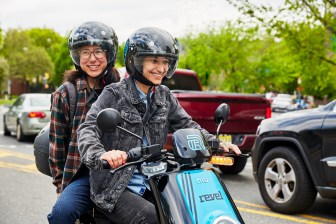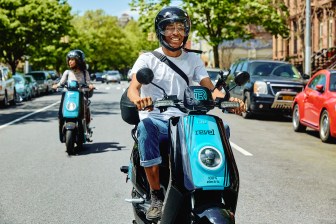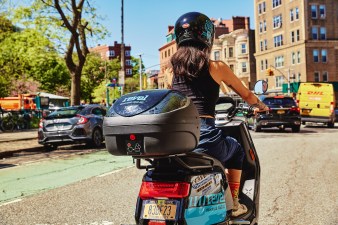Revel Temporarily Ends Scooter Service In New York City

Revel, Revel, your future’s a mess.
Electric scooter share company Revel announced on Tuesday morning that it had abruptly shut its service in New York City pending a review of safety measures after two riders died in separate crashes this month — and Mayor de Blasio all but said the company can’t continue renting the 30-mph mopeds “without making this service safe.”
The company announced the shutdown in a tweet this morning, and a spokesperson told Streetsblog that there would be no further comment.
New York riders – starting today, NYC service will be shut down until further notice. We’re reviewing and strengthening our rider accountability and safety measures and communicating with city officials, and we look forward to serving you again in the near future.
— Revel (@_GoRevel) July 28, 2020
The Revel announcement came after two deaths this month: CBS2 reporter Nina Kapur on July 18 became the first New Yorker who was killed on a Revel since the company began in 2018. Kapur was thrown from a scooter driven by a friend in Greenpoint.
And early on Tuesday morning, 32-year-old Jeremy Malave died after he crashed his Revel into a light pole in Queens.
Revel’s pullout also came after Rep. Adriano Espaillat called for the state DMV to take the scooters off of city streets on Monday after a rider in Inwood suffered head trauma in a crash. The pro-car congressman believes the electric scooters should be regulated as motorcycles, meaning riders should be forced to get a special driver’s license — a move that would cut the company’s ridership to a fraction of the tens of thousands of current users.
Mayor de Blasio piled on the company at a press conference on Tuesday morning, claiming Revel could not return its scooters to city streets until he’s satisfied the two-wheelers are safe. He did not provide specific safety measures beyond hinting that users might have to take some sort of road test. (The company provides two helmets in a carrying case on the back of each scooter.)
“When you see an incident, a few incidents, it causes concern,” de Blasio said. “This has gotten to be too much, it doesn’t work the way it’s structured. I’ve been clear with Revel — they cannot be open in this city without making this service safe and if they don’t, we won’t allow them to come back to this city at all.”
He also connected Revels to motorcycles, which are far more dangerous, go far faster, and have been involved in more than a dozen fatalities so far this year.
“It stands to reason that if folks are using a thing that is like a motorcycle without having to have a license like you need on a motorcycle, that it’s going to put folks in harm’s way. This is very new in the city and the results have been very painful,” the mayor said.
The mayor’s comments echoed some New Yorkers who say they are irritated at seeing people ride Revel scooters the wrong way down streets or through stop signs or steady red lights. But there is a hypocrisy involved when it comes to people’s belief that Revels are a greater danger on roadways than cars and trucks. In 2020 alone, 96 people have been killed and 18,761 people have been injured in motor vehicle crashes within the five boroughs.
Those numbers were not lost on Transportation Alternatives Executive Director Danny Harris.
“The mayor chose to target Revel for criticism, but he has not said anything about Ford and Dodge and other car makers whose products kill and injure far more people,” Harris said. “If you’re in a 6,000-pound SUV, you have free rein over the city to kill or maim with no punishment, but if you’re on an e-bike, we have to spend years arguing about the speed you’re allowed to ride.”
Harris said the dichotomy typifies the de Blasio style.
“We judge mayor on how he acts in a crisis, and in this crisis, the mayor has allowed police precincts to shut down streets using materials that could right now be deployed for truly protected bike and bus lanes,” Harris said. “With this mayor road safety is a constant fight that forces us to devote time and resources to fight for Vision Zero improvements that we know work and have been built, but are not built to scale. Last year, it took 15 dead cyclists and a die-in to get the mayor to respond with a ‘Green Wave’ plan that has since been cut back because of the budget. But today, he’s going after something that’s high-profile instead of the thing that is killing most New Yorkers on the street: cars.”
Of course, Mayor de Blasio didn’t mention the dangers of automobiles during his press conference — even though Hizzoner has talked up the dangers of cars when it suits him, as he did when expressing his opposition to establishing an open streets program in New York City earlier in the pandemic.
“The leading [open streets] model was Oakland,” the mayor said in April. “It’s something of an honor system, if you will [of drivers not running down pedestrians]. … I do not think that model fits our circumstances specifically. Obviously … we have a very different driving culture.”
Despite the deaths in July, Revel seemed to be gaining footing in the city, where it began operations in 2018 in only a thin slice of western Queens and the Brooklyn “brownstone belt.” The company expanded to northern Manhattan in 2020 during the coronavirus pandemic and offered free memberships to health care workers. With some customers still afraid to take public transit, the scooters — like Citi Bike, which also offered discounts and is often criticized as dangerous despite limited evidence — were seen as an important mobility option.
“It’s great to see this New York company rise to the occasion in our city’s time of need and find a way to help the healthcare workers who are on the front lines battling this pandemic for all of us,” Council Speaker Corey Johnson said at the time.
Revel appears to be continuing operations in Austin, Miami, Oakland and Washington, D.C.
Revel has been criticized for its riders’ safety practices. In early July, the company announced it suspended 1,000 user accounts for unspecified violations of its terms of service. But even before that, Revel struggled with getting users to ride its scooters properly. Last summer, it tried to encourage safe riding by offering expanded, and free, riding lessons for users, who can do as little preparation as handing over $19 to register and uploading a picture of their driver’s license in order to start riding the scooters.
And last August, attorney Daniel Flanzig sued the company on behalf of cyclist Paul Dicesare, who suffered a broken ankle when a Revel rider crashed into Dicesare while attempting to make a left turn.
“Part of our claim is that they are putting people out there without proper training,” Flanzig said at the time of the suit. “It goes 30 miles an hour, faster than a bike. Forget about injuring yourself, you’re putting pedestrians and cyclists at risk.”
Streetsblog reached out to City Hall to see if the mayor is now considering a ban or restrictions on private cars or on their operators, but have not heard back.


